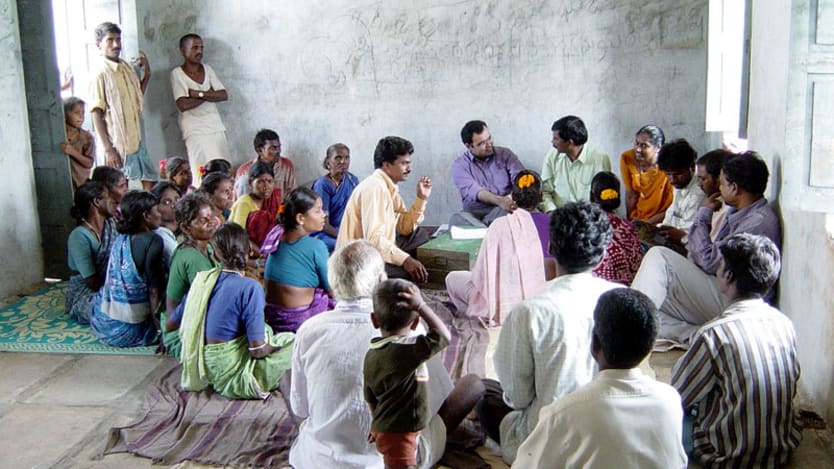
India is on the rise, continuing its transition from international aid recipient to donor. The country’s aid spending more than doubled the amount it received from foreign donors in 2014 and 2015. This past fall, the United Kingdom announced “rapid growth and development progress” had made its ongoing aid unnecessary, and it would transition away from direct financial support.
Vikesh Mehta, the leader for Grant Thornton India’s Public Sector practice, has seen firsthand how India has grown over the past few years, working directly with government partners, donor organizations and the nonprofit sector, while overseeing the company’s public-private partnership projects. As one of the world’s largest assurance tax and advisory firms, Grant Thornton offers its expertise to clients in a country that saw economic growth of 7.5 percent in 2015 — faster even than growth in China.
Devex spoke with Mehta about the dynamic future of India’s economic and social development arena and the role private sector partners such as Grant Thornton play in helping the country forge a new way forward.
Here are some highlights from that conversation, edited for clarity and style:
How has Grant Thornton leveraged its experience and relationships in the development space across India?
Drawing on expertise from Grant Thornton member firms across the world such as the U.S., the U.K., and various offices across Asia, Africa and the Middle East means we understand how development programs are run, what the challenges are and how they should be designed properly. We’ve continually applied this learning in our work in India. We and our public sector clients also now benefit from a number of strategic teaming partners in support of development projects offering support to donors, both regionally and locally.
What are the main obstacles the firm has faced in terms of building partnerships?
Our largest buyer tends to be the government and it can be a challenge meeting their expectations. They want their advisors and implementing partners to bring in every kind of skill — technology, human resources and multi-faceted professionals. Yet, it’s rarely possible for any single service provider to have all this expertise. We believe that sustainable and strategic partnerships are the key to responding to the often challenging needs of government and, by extension, donors in the country. We ensure that any partners we bring on board are aligned to our objectives and those of our clients.
How do you think corporate social responsibility practices, and the increased recognized commitment to this idea, has had an impact in practice on international development in India?
We’re committed to delivering lasting impact and improving people’s lives at a community level, and achieving this through our global and local work.
Interestingly, what we're seeing develop now is the increasing involvement of the private sector in government programs and the divide between government and private sector disappearing. So the private sector is progressively not only the “private” in the PPP but also the implementing partner in large government development programs, such as the Skill India, Clean India and Digital India initiatives.
Currently one our best examples in India is our engagement with Walmart, which opened its first store in India in 2009 and since has been pushing for additional commercial expansion. Several multinational corporations such as Walmart and Pepsi are considering teaming up with government and donors such as the World Bank to provide funds and management expertise, and to help farmers create farmer producer organizations from whom they can directly procure farm produce — thereby reducing the value leakage in the intermediary chain.
This is a great example of collaboration between large MNCs investing in India and benefiting from government policy interventions with the help of the wider domestic community and advisors such as Grant Thornton.
How do you think the Sustainable Development Goals have made you re-think your corporate mission and work across India?
We recognize the power and potential of the SDGs as a framework for private, public and not-for-profit sectors to come together using a common language for sustainable development. There has been a significant increase in awareness and partnerships among these sectors that we did not previously experience in India.
“Looking further to the future, the focus will be on sustainable development through financial inclusion, digital empowerment, smart and safe cities and skill development.”
— Vikesh Mehta, the leader for Grant Thornton India’s Public Sector practiceWe’re seeing that the Sustainable Development Goals are altering the objectives of many of our programs. For example, historically in sustainable agriculture, more than half of fresh produce in India would have gone to waste because of a lack of storage facilities. Now, creating sustainable agriculture is one of the objectives of the government that we’re helping to achieve. Renewable energy is also one of their priorities and that too is playing an important role in shaping the work we do.
How has your work evolved and how do you see it developing over the coming years?
Over these past 15 years, the work we do and partnerships we have built have evolved with the needs of the country’s economy, which is very dynamic. The needs of international donors and the local government keep changing too. We have adapted quickly and responded to these changes.
We’ve witnessed — and been integral to — three phases of development. When we began our involvement, the country depended on external aid from multilateral organizations, such as the World Bank. Our work was largely centered around development projects — such as livelihood projects to eradicate poverty and offering small loans to help people become more sustainable. As the country progressed to phase two, government policy shifted toward infrastructure creation.
Phase three is where we are now as the economy has grown and the government is not as dependent on external support. That said, poverty eradication and inclusion remains a focus. There continues to be large-scale development in skilling, digitization, and in the widespread use of IT and technology in general, with stronger participation of the private sector — all of which we’re working closely on with the government and our partners to prioritize and progress.
In line with the SDGs and with the current government, I think we’ll do more work around sustainable and economic development — creating jobs rather than providing microfinance loans that by themselves are not sustainable. Reducing carbon emissions; clean, renewable energy; smart water management, especially in the context of agriculture; sustainability reporting; and CSR are all areas we see emerging rapidly. Looking further to the future, the focus will be on financial inclusion, digital empowerment, smart and safe cities and skill development.
It can be a challenge for large organizations to work cohesively, but the learning locally in India has significantly contributed to our global development strategy and we will continue to leverage the experience of our global specialists in the region and beyond.
What can you take from experience and lessons learned toward the phase of the firm’s engagement in India?
As our firm in India grows, we’re increasingly involved with program and project management, working on projects that span across a number of years and require multi-disciplinary skills. Government clients no longer want to buy only financial management or feasibility or IT services; they need end-to-end solutions, from strategy to implementation with measurable outcomes. We’re learning from our larger global counterparts and I think we’re going to see some tangible differences as a result.
Our focus has shifted from infrastructure and development to become a driver of growth and economic development. I think we’ll continue to see our services to our clients evolve, driven by partnerships within our network around the world and also through local influences. We sit at the intersection of private, public and NFP sectors and recognize that the lines between all three are now blurring. Therefore it is important that we’re close to — and remain watchful of and agile to — the needs of the country, in order to continue to provide valuable contributions to India's attainment of the global goals.
What are you most looking forward to at Devex World, and what is the one trend or innovation that you would like to discuss with other people from the wider global development community?
Devex World is a one-of-a-kind event and I’m excited to be a part of it. I’m looking forward to networking with experienced professionals from the development world, particularly people who have dealt with the challenges of managing the development needs of millions of underprivileged people in an otherwise chaotic, high-growth economy. Extensive use of the internet, mobile technology, apps and IT have significantly improved governance through greater transparency and more efficient public service delivery in India — but there’s a lot more that can be done and I’m looking forward to learning about innovations and success stories from around the world in these areas.
Follow Focus On: Devex World for more conversations emerging from the global development event of the year.








